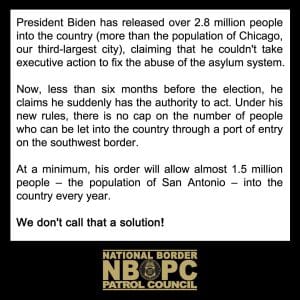For the past two decades, the National Border Patrol Council (NBPC) has successfully derailed attempts to eliminate Administratively Uncontrollable Overtime (AUO). However, in recent years, the frequency and magnitude of the attacks on AUO have dramatically increased, causing the NBPC to reconsider the issue and review the alternatives. As a result, nearly two years ago, the NBPC developed Border Patrol Pay Reform.
In President Obama’s Fiscal Year (FY) 2014 budget request, which was submitted to Congress in April, he proposes to cut Border Patrol agents’ overtime by $46 million from the current FY13 Continuing Resolution (CR) allocation. This proposal would guarantee that we would never again see AUO at the 25% level despite the fact that proper border security mandates this level of overtime. When the President’s proposal is combined with the Budget Control Act of 2011 (“Sequestration”), the FY14 overtime cuts would jump – in the best-case scenario – from $46 million to $65 million or – in the worst-case scenario – to $90 million. A $65 million cut could decrease AUO to 15%, which would be disastrous on our personal family budgets and border security. A $90 million cut would almost undoubtedly mean the end of AUO in exchange for a system that would arbitrarily dole out 45 ACT where the agency deems necessary. This would equate to a lot less hours, which means a significant reduction in the number of agents on the border and a drastic decrease in our earnings and retirement.
Due to the current fiscal realities, the NBPC is faced with three choices:
1. Struggle to maintain AUO and the status quo;
2. Aggressively lobby for the Border Patrol Pay Reform Act; or
3. Acquiesce to Law Enforcement Availability Pay (LEAP).
Unfortunately, the option we all like best, AUO, is no longer viable. AUO gives the agency too much power to manage and reduce overtime earnings to percentages that conform to budgetary restraints. As noted above, if the money isn’t allocated through Congressional Appropriations, our earning potential and border security take a huge hit. We are living that reality today.
The second option is the Border Patrol Pay Reform Act (“BPPRA”), which is similar to LEAP but with protections from supervisors forcing us to work for free. As currently written, BPPRA will give all rank-and-file Border Patrol agents a two-step increase to offset the loss of FLSA. It also ensures that we get paid for any hours we work.
BPPRA is availability pay, which like LEAP, means the agency can schedule an individual agent to work for up to 2 hours per day above the base 8-hour workday. But unlike LEAP, if an agent exceeds 98.5 hours in a pay period the agent will be entitled to FLSA pay.
BPPRA is a Border Security measure, which is why it is getting so much traction in Congress right now. The NBPC is currently running BPPRA down two avenues. Senator Jon Tester introduced it as a stand-alone bill on June 7th, and will introduce it as an amendment to the Comprehensive Immigration Reform (“CIR”) bill now pending before Congress. Inasmuch as BPPRA is considered a bi-partisan measure and because both sides are pushing immigration reform, it is inexorably tied to CIR as a Border Security provision. This has allowed the NBPC to get and maintain support for the pay reform. In the event Border Patrol Agents don’t want the BPPRA to be tied to CIR, the measure will fall apart and we will be left with LEAP or worse, no LEAP and only the de-authorization of AUO.
Because LEAP gives the agency the right to work agents beyond 100 hours per pay period for free, and because the NBPC has been invited by key congressional officials like Senators Rubio and Coburn to participate in the crafting of amendments in order to give CIR more Border Security teeth, the NBPC has decided to attach BPPRA to the CIR bill. BPPRA and LEAP are both availability pay, which means you get paid whether you work the hours or not, but the choice is not the individual agents. SBPAs have the right to schedule us for 10 hours a day, but can also let us leave early if nothing is going on without penalty. The main difference between BPPRA and LEAP is what you get paid for actual work. Under LEAP, all hours over 100 are free. Under BPPRA, anything over 98.5 is compensable as time and a half and anything over 100 is compensable with FLSA. Under the bill introduced by Senator Tester, BPPRA will give all rank-and-file Border Patrol Agents a two-step increase to offset the loss of FLSA. With LEAP, all rank-and-file Border Patrol Agents will lose FLSA and will be given nothing to offset the loss.
The NBPC is excited that Senator Tester introduced our bill, but we want everyone to realize the bill’s introduction does not guarantee passage into law. Further, Congress has the right to amend the bill, which could potentially cut the step increase to one or none, but the NBPC’s lobbyists don’t foresee that happening. We all need to realize that Congress has the right to pass laws as they see fit and the NBPC will continue to work with Congress to make this legislation a reality.
If you have any questions or would like clarification, please ask your union stewards. If they don’t have the answer contact us through the “contact” link on this website and we’ll get it for you


